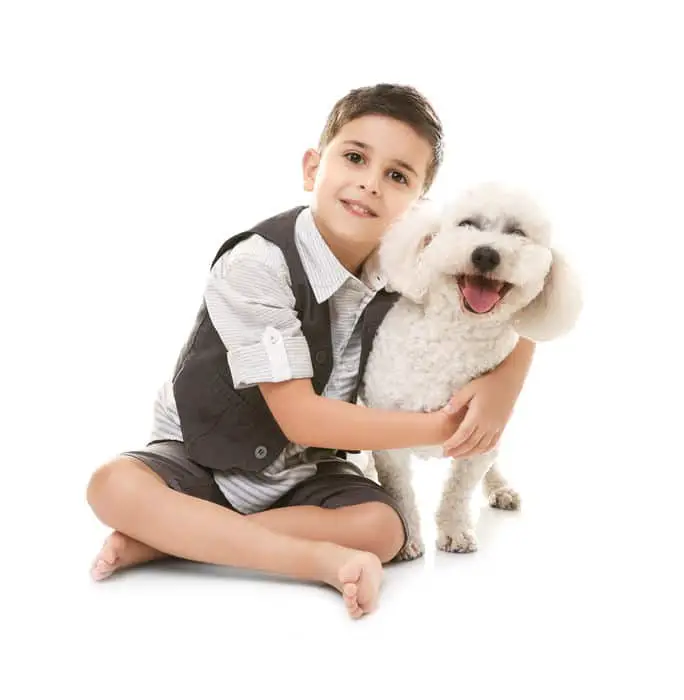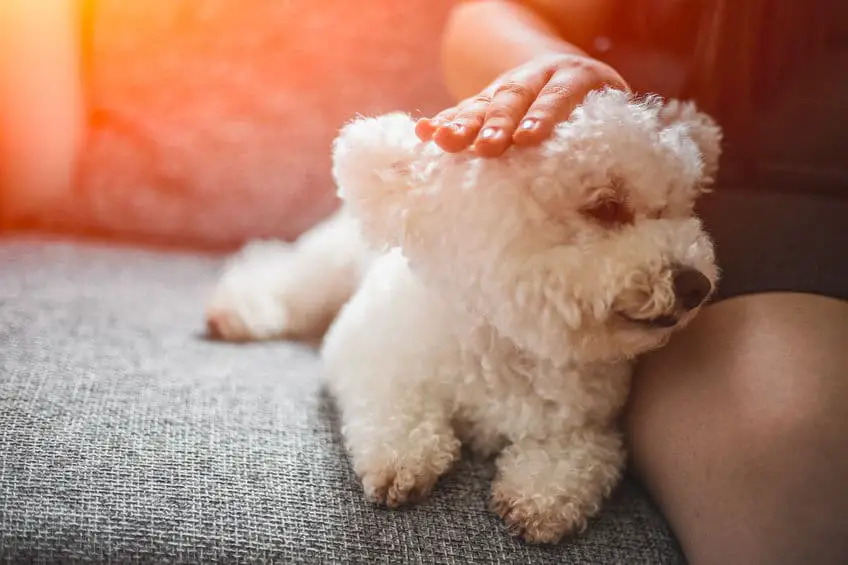This sturdy, furry, hypoallergenic dog breed is well known to be playful, sassy, and resilient while possessing beauty and intelligence as well. With all this wealth of personalities the Bichon Frisé possesses, it is important to also know if the Bichon Frisé is an aggressive small dog breed.
Bichon Frisés are not naturally an aggressive dog breed. They are friendly and would always draw a smile from a stranger due to their merry temperament. Nevertheless, certain factors could lead to the development of aggressive behavior.
In this post, I will be sharing the various factors that can lead to the development of an aggressive personality while exploring solutions you can apply in correcting it.
But first, we have to get a summarized background history of the various temperaments a Bichon Frisé could possess to help us get a better understanding of this small dog breed.
Brief history the Bichon Frisé breed
Bichons were developed in the Mediterranean area but really started out as pampered lapdogs of European nobles in the 13th century, that is until the french revolution started, leaving them on the streets without their owners src.
They had to evolve to survive, going from lapdogs of nobles to circus dogs for street entertainers, doing tricks for coins.
This evolution helped build the resilience of the Bichon Frisé, which was solidified after their experience during the second world war.
They are sensitive and do better with positive reward than harsh, negative methods during training.
Bichon Frisés are merry, friendly dogs, always wanting to be in the company of its owner or people.

This, unfortunately, makes them prone to suffering from separation anxiety when left alone for a long time. Invariably making them a bad choice for an always busy owner.
I have previously written on the Best 9 small dog breed for busy owners, you can check that out if you fall under that category.
Various Signs of Aggression in Dogs
Understanding the various signs of aggression in dogs can help you identify them in your dog. It is important to note that aggression is different from a reaction.
Aggression in dogs is an intent to harm an individual or dog, while reactivity is a dog’s response to certain situations.
For example, a dog could be barking at the sound of a lawnmower due to previous negative experiences it has with it and this has no correlation to aggression.
According to the American Kennel Club, the various notable signs of aggression can be noted in their body language and they include:
- Curled lips, showing teeth in a growl
- Ears laid back or standing upright.
- Hair from the neck to the back standing.
- Intense staring, never taking their eye off the individual.
- Lowered head in a guarding posture
Why Your Bichon Frisé could be Aggressive
Your Bichon could be aggressive due to a number of things, such as being territorial, possessive, insecurity, fear, and anxiety amongst other things.
It is also important to consider your Bichon’s health as a factor for it’s aggressive behavior.
Hyperthyroidism is a health issue that can lead to sudden aggression in dogs. It is a condition where the thyroid glands of a dog are not secreting enough thyroid hormones.
It is important to take your Bichon to the vet for a full exam, especially testing for hyperthyroidism.
Luckily, hyperthyroidism can be treated with medication that aids in hormone replacement, such as thyroxine. Speak to your vet about hyperthyroidism.
With the exclusion of health issues, let’s look into other some notable reasons for aggression, which are behavior and situation-based.
1. Fear
Fear is a great motivation for your Bichon’s aggression. The need to defend itself when cornered or threatened may be born out of fright.
If your dog gets aggressive when strangers approach him, fear could be one of the reasons why. This could be due to people appearing larger from your Bichon’s perspective or their stance intimidates them.
Your Bichon could also perceive the stranger’s approach as a threat and simply seek to defend itself by attacking.
It is important to observe your dog to ensure he/she isn’t frightened. A fearful dog would usually back away if they have the option.
2. Possessive/Territorial
A territorial and possessive Bichon can be aggressive. This happens when the feel their territory is being trespassed.
They can also be overly attached and possessive towards their owner(s), frequently attacking people when they come close to their owner(s).
Also, they can be possessive towards their food or a favorite toy, attacking and even biting when disturbed. This is referred to as ‘Resource Guarding‘, commonly found in feral dogs, that need to survive.
Resource guarding isn’t an aggressive behavior, rather, it is a reactivity behavior. Regardless, this behavior shouldn’t be tolerated in domesticated dogs.
3. Anxiety
Anxious dogs usually display some form of aggression and this is usually found mostly in aging dogs. Anxiety can also be linked to fear.
Events and certain items can be a trigger for anxiety-related aggression, therefore it is important to pay attention to your dog and its surrounding, in order to identify what these anxiety triggering events and items are.
4. Insecurity
An insecure Bichon lacks confidence and is usually unsure of his/her environment.
They would mostly run under a chair or go hiding when faced with situations they feel unsure about.
In these situations, when approached, they might get aggressive in a bid to compensate for their insecurity.
How to Control and Stop your Bichon’s Aggression
Now we have outlined some reasons for your Bichon’s aggression, it is important to look into ways to control and stop this behavior.
To stop your Bichon Frisé’s aggressive behavior, you could apply certain techniques such as socialization, positive reinforcement, trigger elimination, amongst other things. Employ the services of a professional trainer and animal behaviorist if possible.
First and foremost, every situation is unique and it is important to study your dog’s behavior before deciding which technique you should apply towards a solution.
This is where an animal behaviorist or trainer with experience handling aggressive dogs becomes paramount.
With that being said, let’s look at some notable techniques you can use in retraining your dog’s aggressive behavior.
1. Socialization
If your Bichon is notorious for attacking people and other dogs he/she doesn’t know, it could be a result of poor socialization during its early age.
Socialization is an organized exposure of your dog to different people, places, sights, and sounds in a non-threatening and positive environment.
For Bichons older than three months, socialization should be done in a neutral environment, such as the park or an empty sidewalk.
This would make your Bichon less territorial and defensive, instead, he/she will be curious and better focused.
Gently introduce your dog with willing participants, use their favorite treats to let them understand that new people and dogs are alright and pose no threat.
2. Removing the trigger
In situations where there are noticeable triggers, it would be best to remove either your Bichon from that situation or remove the trigger.
Triggers could be certain items or individuals that make your dog anxious, and removing this triggers could be a great way to reduce the stress your Bichon is experiencing.
This method works in unique cases where the trigger isn’t a constant feature in your life or daily activities. Apart from such cases, this method becomes unsustainable on the long run.
3. Use Distraction
In situations of sheer chaos, the use of a distraction can be a great way to briefly restore calm. This method can be used especially for aggressive territorial dogs.
Some distraction technique include:
- Squealing as loud as you can or making use of a whistle,
- Firmly saying No with a stop hand gesture while standing in front of your Bichon to obstruct him/her,
- Practicing tricks like ‘sit’ and ‘stay’ commands, rewarding compliance with treats and praises.
- Using its favorite treats or toy to create a distraction. This could be used to take the focus off the stressful situation or trigger and redirect the focus back on you.
4. Reestablishing Leadership
For possessive Bichons, reestablishing leadership can be a great way to correct aggressive behavior.
Dogs are descendants of wolves and as such, possessive or over-protective dogs usually see themselves as pack leaders.
In most cases we the owners actually help in reinforcing this behavior by unknowingly rewarding it.
There are various ways you can reestablish your leadership position in the pack (family) and one the ways is through food.
Establish yourself as the one and only source of food and eating before he/she does, while being right in his/her presence.
Give a sit or stand instruction and only feed him/her upon compliance.
Dogs are intelligent creatures and by doing this frequently, your dog would get the memo and accept his position in the pack.
With its new found position, preventing and retraining aggressive behaviors becomes more easier.
Controlling a Possessive Bichon Frisé
If you Bichon gets aggressive and attacks people when they come close to you, either to hug, shake or sit next to you then you have a possessive dog.
In most cases, owners are responsible for fostering this behavior, by frequently overlooking and rewarding it.

Dogs are animals of habit and would repeat an action based on the reaction they receive. Fortunately, this means that possessive dogs can be retrained to act differently.
It is important to ensure you are not transferring anxiety and stress to your dog. For example, by closely holding them to you when someone tries to sit next to you or applying tension on the leash when standing next to someone.
If that’s not the case, then we can proceed further and look into a set of actions you can apply to control your possessive Bichon Frisé.
- Remember and accept that you have been fostering and permitting his/her possessive behavior, knowing or unknowingly.
- If your Bichon Frisé attacks people while sitting on your laps or beside you, you need to say “bad dog” ( or use dog’s name) in a firm tone of voice while dropping them quickly, every single time, without fail off your side.
Don’t toss or shove him/her, just quickly and gently drop him.
Timing is essential because if you wait too long, the situation could escalate. So, do it immediately he gowls or shows its teeth. - Do this every time without fail. It is important to do this 100% of the time until your Bichon understands its place in the pack/household and that its action would result in losing your attention and affection.
- An alternate action would be to use a dog crate, keep him behind a barricade, or quickly stand up, walk away, and ignore him/her upon growling.
- When your Bichon understands what is happening and doesn’t react aggressively, praise him, and give him a treat.
- Do this consistently whenever the situation arises.
In conclusion, a Bichon Frisé will make a lovely household pet; always happy, willing to play and entertain new people.

